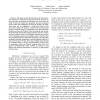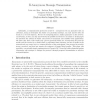469 search results - page 19 / 94 » On Adversary Models and Compositional Security |
CSFW
2012
IEEE
11 years 10 months ago
2012
IEEE
Abstract—This paper studies the foundations of informationflow security for interactive programs. Previous research assumes that the environment is total, that is, it must alway...
STOC
2005
ACM
14 years 8 months ago
2005
ACM
In the setting of secure multiparty computation, a set of parties wish to to jointly compute some function of their input (i.e., they wish to securely carry out some distributed t...
CTRSA
2010
Springer
14 years 2 months ago
2010
Springer
Typical security models used for proving security of deployed cryptographic primitives do not allow adversaries to rewind or reset honest parties to an earlier state. Thus, it is c...
CCS
2003
ACM
14 years 26 days ago
2003
ACM
Informally, a communication protocol is sender k - anonymous if it can guarantee that an adversary, trying to determine the sender of a particular message, can only narrow down it...
CORR
2010
Springer
13 years 7 months ago
2010
Springer
In secure multi-party computation n parties jointly evaluate an n-variate function f in the presence of an adversary which can corrupt up till t parties. All honest parties are req...


